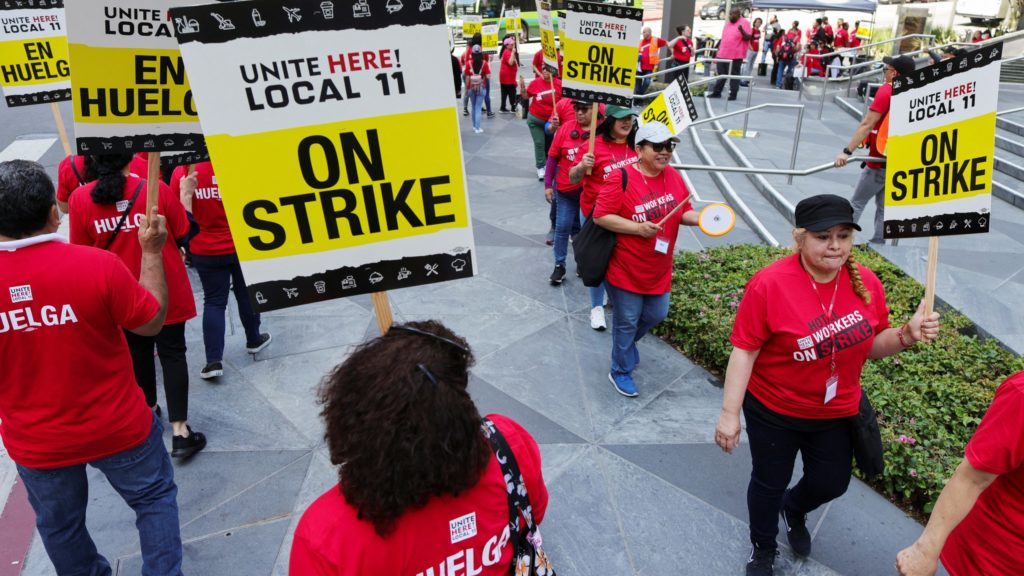Hotel workers in Southern California walked off the job for three days around the Independence Day holiday asking for higher wages, affordable family health care, a retirement pension, and manageable workloads. However, they returned July 5 -- without a deal in place -- with the union vowing the strike was "just the first wave" until hotel workers could actually afford to live in the communities where they work.
"This walkout was the first of many actions that may come this summer by workers at hotels across Southern California, and it is only one tool in our toolbox," Kurt Petersen, co-president of Unite Here Local 11, said in a July 5 statement to OSV News. "We have put the industry on notice that the workers have suffered enough."
Contracts between 61 Los Angeles and Orange County hotels and members of Unite Here -- a labor union representing 300,000 workers across Canada and the U.S. in the hotel, gaming, food service, manufacturing, textile, distribution, laundry, transportation and airport industries -- had expired the night of June 30.
Impacted by the lack of a collective agreement in Southern California are more than 15,000 cooks, housekeepers, dishwashers, bartenders, front desk agents, food servers, bellmen, hosts, laundry attendants, banquet servers, phone operators, lobby cleaners, concierges, spa workers and bussers at major brands and properties such as Hilton, Hyatt, Marriott and Sheraton.
Workers are asking for a $10-an-hour wage increase to keep pace with the rising cost of housing.
"We went on strike to show these companies what we were willing to do to win a fair contract," Joy Johnson, described as a Courtyard Marriott housekeeper for five years in downtown LA, said in the union statement she was "proud to be part of the first wave of strikes."
The union's statement says the Independence Day walkout is "just the first wave of strikes and disruption by hotel workers across the region" until workers achieve agreements that allow them "to live in the communities where they work." Unite 11 said the industry can reach such an agreement, pointing to one reached prior to the strike with LA's Westin Bonaventure hotel.
Keith Grossman, spokesperson for the coordinated hotel bargaining group, told LAist.com, before the strike concluded, that the group will meet with the union to resume negotiations. But they are also "fully prepared to continue to operate these hotels and to take care of our guests as long as the disruption lasts."
On its website, Unite Here Local 11 claimed "during the pandemic, hotels received $15 billion in federal bailouts and cut jobs and guest services such as daily room cleaning. In 2023, hotel profits in Los Angeles and Orange County surpassed pre-pandemic levels. Yet hospitality workers struggle to afford a place to live in the cities where they work and are forced to move further away because wages are not keeping pace with the cost of housing."
According to Unite Here Local 11, 53% of workers they surveyed said that "they either have moved in the past 5 years or will move in the near future because of soaring housing costs."
The U.S. Department of Housing and Urban Development considers $66,750 per year for a one-person household as the "low income" threshold in LA County. But in order to afford the average $2,781-a-month, 788-square-foot Los Angeles apartment -- spending no more than the recommended 30% of income -- more than $100,000 in income is required.
"As a result of skyrocketing inflation, especially in the cost of housing, Los Angeles' hotel workers no longer earn a living wage," Clayton Sinyai, spokesperson for the Catholic Labor Network told OSV News. He said the organization "stands in solidarity with them during their strike."
Both popes and prelates have spoken directly to the issue of strikes.
The Catholic Church has an extensive history of teaching and actions from past popes -- Pope Leo XIII, St. John XXIII, St. Paul VI and St. John Paul II to Pope Benedict XVI, among others -- that support the rights of workers.
St. John Paul stated in his 1981 encyclical "Laborem Exercens" that strikes are "recognized by Catholic social teaching as legitimate in the proper conditions and within just limits. … Workers should be assured the right to strike, without being subjected to personal penal sanctions for taking part in a strike."
The U.S. Conference of Catholic Bishops' 1986 pastoral letter "Economic Justice for All" advises, "Unions may also legitimately resort to strikes where this is the only available means to the justice owed workers."
Quoting the bishops' teaching, Michael Donaldson, senior director for the Office of Life, Justice and Peace at the Archdiocese of Los Angeles, told OSV News in an email, "'The economy must serve people, not the other way around.'"
"All workers have the right to good working conditions and fair and just wages," he said. "The dignity of every human person is always to be honored and upheld in one's workplace."

